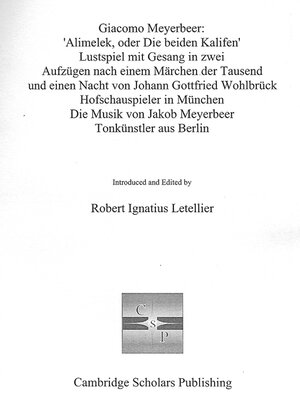
Sign up to save your library
With an OverDrive account, you can save your favorite libraries for at-a-glance information about availability. Find out more about OverDrive accounts.
Find this title in Libby, the library reading app by OverDrive.



Search for a digital library with this title
Title found at these libraries:
| Loading... |
The subject-matter of Meyerbeer's second opera Wirt und Gast, or Aus Scherz Ernst (also called Alimelek), written in Munich in 1812, was taken from a tale in The Arabian Nights. The story of the man who would be sovereign, if only for one day, so frequently treated in the literature of all nations. The opera is an example of the Oriental or "Turkish" operas which were so popular in Germany during the second third of the eighteenth century. The orchestra includes, besides the strings, doubled wood-wind, and threefold percussion, only two horns, two trum¬pets, and one trombone.While Meyerbeer's contemporaries were puzzled by the far-¬fetched singularity of the Alimelik music, and the work had no success in Stuttgart and Vienna (6 January 1813; 20 October 1814), Weber had the insight to recognize its true significance. He produced it Prague on 20 October 1815, and praised the "active, alert imagination, the well-nigh voluptuous melody, the correct declamation, the entire musical attitude." He was also impressed by the instrumentation: "It is surprisingly combined, interwoven with great delicacy, and consequently demands almost the care of a quartet performance." Weber's enduring admiration meant that he again produced the work in Dresden years later (1820), when he pointed out how this early opera "bears witness to the composer's singular emotional capacity." This facsimile edition contains the composer's entire conception of the work, restoring material cut from the first performance.¬Meyerbeer shows astonishing maturity for a composer of twenty-one. Not only the psychic state of the leading characters, but also the conflict of the entire plot, is presented in concentrated style by the aid of recurrent themes. "The specifically romantico-psycho¬logical modification of the leading-motive is met with here for the first time, i.e., two years before Wagner's birth" (Edgar Istel).






